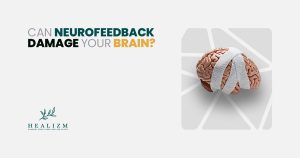
Neurofeedback brain training is becoming more popular.
Uses technology to track brain activity and give users feedback on control their brainwaves.
At Healizm, you can get our neurofeedback service.
Let’s discuss the potential benefits and risks of how it can affect the brain. And let’s find out: Can Neurofeedback Damage Your Brain?
Continue reading to find out more!
Table of Contents
What is Neurotherapy?
Neurofeedback, or EEG biofeedback, utilizes computer-based technology to offer immediate insights into brainwave activity.
This feedback assists in regulating brain functions, aiding in relaxation or concentration.
The idea behind neurofeedback is called operant conditioning. Positive feedback is given to people through a visual or auditory signal.
Over time, individuals understand how to link this feedback to their desired mental state, making it simpler to achieve. Various forms of neurofeedback exist.
- EEG (Electroencephalogram),
- HEG (Hemoencephalography),
- FMRI (Functional Magnetic Resonance Imaging)
Each type measures brain activity differently and uses different technology.
Side Effects of Neurofeedback
Patients may experience side effects during or after neurofeedback. These side effects usually go away quickly. Let’s look at one by one:
- Fatigue: Temporary tiredness might occur during or after sessions but usually gets better with time.
- Existing Conditions: Previous neurological conditions may influence side effects, so it’s important to inform your doctor about them.
- Headaches: could happen if targeting the wrong areas or using excessive pressure on the cap.
- Head Pressure: is rare, usually brief, and often linked to training specific brain sections.
- Low Energy: sometimes observed in high-energy individuals undergoing therapy to reduce hyperactivity. It’s a sign of therapy-adjusting activity levels.
- Muscle Tension: It can occur if therapy isn’t administered correctly, especially with higher frequencies.
- Anxiety: Might arise due to electrodes or general nervousness but tends to fade away post-session.
- Brain Fog and Focus Issues: Possible if the practitioner lacks proper training.
- Potential Depression Worsening: Increasing slower brain waves could trigger depression in individuals previously unaffected.
- Dizziness: Mind wave changes could cause this to happen during or after sessions. Reporting panic or claustrophobia during training should happen right away.
Can Neurofeedback Damage Your Brain?
So, are you curious about how can neurofeedback make you worse? Neurofeedback therapy is a brain training technique that has gained popularity in recent times.
To help people control their brainwaves, technology tracks brain activity and gives feedback.
Neurofeedback has risks and side effects, but no research suggests it can cause brain damage or other serious side effects.
In other side let’s talk about benefits of neurofeedback technology.
Neurofeedback therapy is useful for improving brain function and overall health because it has many benefits, such as:
- Sharper Mental Performance: It helps improve cognitive abilities like focus, memory, and thinking skills.
- Better Mood Control: Reduces symptoms of anxiety, depression, and cravings for substances, aiding in mood regulation.
- Non-Invasive Approach: It’s a safe and non-intrusive treatment, enabling patients to manage brainwave changes.
- Enhanced Brain Patterns: Assists in aligning brainwave activity for improved focus, emotional balance, and better sleep quality.
- Reduced Depressive Episodes: Helps gain control over brain activity, potentially decreasing depressive episodes.
- Treatment for Various Conditions: Shows promise in addressing ADHD, anxiety, epilepsy, insomnia, addiction, and other conditions, as well as aiding in pain management and performance improvement.
- Traumatic Brain Injury Support: Effective in treating brain injuries by targeting specific brain areas and adjusting brainwave frequencies through personalized treatment plans.
Conclusion
Based on the information provided, there is no evidence to suggest that can neurofeedback damage your brain. Neurofeedback therapy is generally considered safe and effective for treating various neurophysical disorders.
Multiple sources emphasize the safety and potential benefits of neurofeedback therapy, including its use in treating symptoms of traumatic brain injury.
Although some studies suggest temporary side effects, most agree that neurofeedback shows promise as a safe treatment option.
FAQs
- How important is neurofeedback for mental health?
Mental health benefits from neurofeedback include cognitive enhancement, anxiety and depression reduction, and emotional regulation.
- Is neurofeedback stress therapy a solution?
Neurofeedback can assist in stress management by helping regulate brainwave patterns, potentially reducing stress-related symptoms. However, individual results vary.
- Is neurofeedback therapy online available?
Yes, some practitioners offer neurofeedback therapy online. Virtual sessions can provide convenience, but ensure the credibility and reliability of the provider.
- How to get neurofeedback covered by insurance?
Coverage for neurofeedback may vary among insurance providers. To explore coverage options, contact your insurance company directly and inquire about neurofeedback therapy benefits or reimbursement possibilities.
